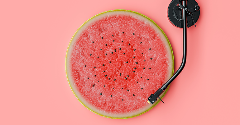News
Following second quarter earnings report, Coca-Cola looks to drop more brands
30 Jul 2020After Coca-Cola announced the discontinuation of its Odwalla juice brand earlier this month, Coke's CEO James Quincey said during the company's second quarter earnings call that more of the CPG giant’s brands will be on the chopping block in the near future. He declined to name any brands specifically.
“We are shifting to prioritizing fewer but bigger and stronger brands across various consumer needs,” he said on the earnings call. “As a reference point, of our 400 master brands, more than half are single-country brands with little to no scale.” Those 200 brands only account for 2% of Coca-Cola’s total revenue.

With the pandemic straining supply chains worldwide, Quincey said that Coke responded by focusing its efforts on providing resiliency for its core brands. The strategy resulted in a 14% increase in volume growth in China during the second quarter. Overall, the Atlanta-based giant saw sales drop 28% to $7.2 billion.
Coke is taking this pared-down mentality and will be spreading it further across its business units. Already, the company has eliminated 275 “zombie” products in 2019, CNN Business reported.
While many brands may no longer be on supermarket shelves in the coming months, Coke is not turning its back on innovation. “We believe the best way forward is to be more choiceful and target bigger, more scalable bets and be disciplined in our experimentation,” said Quincey in the call. One of those rising star brands is Topo Chico.
Coca-Cola is not alone in streamlining its offerings to focus on its best-selling brands. Unilever and PepsiCo similarly trimmed their product offerings in favor of promoting items that are perennially popular and a sure bet for sales. PepsiCo’s Frito-Lay division slashed 21% of its SKUs in the midst of the pandemic, Food Dive reported. In fact, in U.S. grocery stores, the average number of product offerings declined 7.3% in the four weeks leading up to June 13, according to Nielsen data.
Trimming the list of products may benefit Coca-Cola in the long term by reducing decision fatigue from consumers and allowing the manufacturer to double down on those brands to compose a product mix that will become the lifeblood of its success.
Related news

Retail landscape lacks nutritious and affordable food, says ATNi
30 Dec 2025
A rapid increase in modern food retail has given retailers growing influence over consumer diets, according to global non-profit ATNi’s latest assessment.
Read more
Debate over ban on ‘meaty’ names for plant-based products reaches stalemate
26 Dec 2025
The debate over a ban on plant-based products using “meaty” terms has reached a stalemate, leaving manufacturers in limbo and still facing overhauls to their marketing and packaging.
Read more
Multi-sensory food and drink products to gain traction in 2026
16 Dec 2025
Trend forecasters predict that sensory elements will play a larger role, helping food and beverage brands differentiate themselves in a competitive market in 2026.
Read more
Big appetite for M&A between European and US food and drink companies
3 Dec 2025
Persistent tariffs on EU food and beverage exports have helped drive record levels of M&A activity between European and US companies this year, according to analysis by ING.
Read more
Non-UPF Program extends certification scheme to entire food industry
30 Nov 2025
The Non-UPF Program has extended its certification scheme to the wider food sector, championing a move towards healthier consumption habits.
Read more
Lancet study links UPFs to chronic disease risk
26 Nov 2025
UPFs are consistently associated with an increased risk of diet-related chronic diseases, according to a comprehensive review of global evidence in The Lancet .
Read more
Concerns swirl around cinnamon’s compliance with EU law
25 Nov 2025
Cinnamon may be a top functional ingredient, but it needs stronger protocols to ensure it meets EU food safety laws and quality standards, say researchers.
Read more
Oat Barista: Innovation for game-changing beverages
20 Nov 2025
Oat Barista is a clean label, sustainable, and innovative drink base specifically designed to create the perfect foam in one single ingredient.
Read more
How younger consumers are redefining ingredient choices and rejecting brand loyalty
18 Nov 2025
Gen Z and millennial consumers’ preferences for transparency, functionality, and purpose are “redefining the very nature of consumption itself”, says SPINS.
Read more
Hybrid formats and flexible positioning to disrupt category norms in 2026
17 Nov 2025
Trend forecasters expect food and drink to move more fluidly across occasions, functions, and formats as consumers seek versatility, novelty, and convenience.
Read more